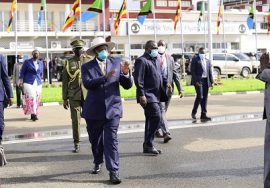
Ugandan firm cited in DRC gold scandal
The Joint Security operatives have mounted a hunt for officials from a gold company accused of exporting consignments with incomplete documentation.
The officials identified as Peter and Mulindwa, working with Trans-Equator Miners (U) Ltd., allegedly smuggled a consignment of 6.5 tons of gold from the Democratic Republic of the Congo (DRC) into Uganda.
It has been found out that 3.6 tons of the 6.5 tons have already been exported out of Uganda. Information got from the Ministry of Energy and Mineral Development reveals that Trans-Equator, working with Dorado Precious Metals and Stones Trading, has been working on the documentation for exporting a 500kg consignment of the precious metal but later abandoned the process.
A source from the ministry reveals that Trans-Equator could have exported more consignments with incomplete documentation, as they were occasionally seen at various places with foreigners seemingly in the process of transaction.
DRC officials have since been in Uganda investigating Trans-Equator and later landed on the document of transaction with Dorado Precious Metals and Stones Trading, a foreign-owned company. This has given them confidence that if they are arrested, the Trans-Equator officials will lead them to both Dorado and other companies stealing their precious metal and have them answerable for all gold theft cases in the DRC.
This is not the first time such a scenario has happened in Uganda. Recently, as reported by Reuters, Ugandan authorities said they are investigating the country’s biggest gold refinery over recent imports of an estimated 7.4 metric tons of gold, worth some $300 million.
Ugandan state-run media (New Vision) also reported the gold could have originated from Venezuela, which has been selling gold to prop up its struggling, sanctions-hit economy.
African Gold Refinery (AGR) said that the gold came from South America but gave no further details and rejected allegations of smuggling.
“All the required documents have been provided to them (the police). AGR transactions are legal, and documentation is 100% legitimate,” the firm said in a statement to Reuters.
Fred Enanga, a spokesman for Uganda’s police, said intelligence reports indicated that AGR received a shipment of 3.8 tons on March 2, 2019 and then another shipment of 3.6 tons on March 4, 2019. Neither shipment passed through official customs entry points, he said.
Then, on March 7, police raided the premises of AGR after securing a court order and found the 3.6-ton batch, but the first shipment had disappeared, he said.
“Investigators have already questioned and obtained statements from officials at AGR. We are very interested in them indicating to us where the 3.8 tons of gold are,” Enanga told Reuters in an interview.
Uganda has over the years evolved as a regional gold smuggling and trading hub, with dealers exploiting its proximity to the Democratic Republic of the Congo, which produces tons of gold but has been plagued by decades of conflict and mismanagement.
Rampant corruption, lax rules, and weak enforcement mean smugglers face few hurdles as they ship or trade the lucrative metal through Uganda, analysts say.






